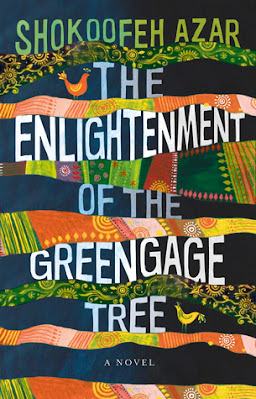I'm very glad that Halyna Hryn has taken on the job of translating Zabuzhko's works; otherwise they'd be inaccessible, since I haven't seen any of them translated by anyone else. I read Zabuzhko's short story collection
Your Ad Could Go Here last year, and now I'm tackling her classic, a book that was published in 1996 when Ukrainian independence was still fresh, and whichbecame a bestseller for a decade. Many of the translated versions use the same cover as the original because, I mean, it's perfect.
This novel is told from the perspective of a Ukrainian writer who is in the States as a visiting professor in Slavic Studies. She begins a relationship with a Ukrainian artist, someone who is familiar with her culture and her language (language is a big issue here; a symbol of home and stubborness in the face of Soviet oppression, of identity and the future). However, despite the link to home, there are flaws in their relationship; he doesn't give her the physical satisfaction she's wanting, in fact he can be quite violent. And their emotional relationship becomes fractured and manipulative the longer they go on. She's quite settled in the US, while he prefers to travel back to Ukraine often, so their expectations of social conventions around relationships diverge as well.
Zabuzhko's style is a breathless, hurtling one with long sentences full of numerous subclauses and various thoughts crammed in. I enjoy this style especially in this book, it seems to fit the confessional tone of the narrative well. She is frank and open about her sexual life, something that was not common when this book was written; it's a perspective that was missing from Ukrainian literature but her feminist approach meant she opened up these themes for Ukrainian women writers. She also ties the examination of abusive relationships to the national questions of Ukrainian identity and its struggle under an abusive neighbour. The narrator is able to be a staunch Ukrainian, grounded in her Ukrainian identity and the value she places on the language and history, while still recognizing the flaws of misogyny and patriarchy in that culture.
Anyhow, as to plot, the story itself is a readable, confessional story of a bad relationship that can't be saved no matter how hard she tries (and predictably, it is mostly just the female character who is trying to fix things). There is a sentence about 3/4 of the way through that provides the turning point; it's a dream that our main character has had:
"he was slowly walking away, back toward her...walking along a narrow plank heading down somewhere, where -- she couldn't tell... and matter-of-factly the realization came in her sleep: he won't be saved, nope, he won't."
At that point there seems to be a decision, no matter how small, to move forward, to reclaim a sense of self and identity outside this relationship. The book is fiction, although there is some discussion of just how fictional it is, and how much is drawn directly from Zabuzhko's life. It has a strong voice, and it's a passionate monologue about language, national identity, feminist values, and the flaws of the culture that she is nevertheless deeply committed to. It's discursive, ranging all over the place and switching between first, second and third person (in the way that we do when we are thinking or talking grandly about life). I love her style and her rants are angry, sharp and pointed. The plot is a bit of a romantic cliché but it's used as much as a metaphor as a reality, which makes sense in the end. If you like her style, you've got to read this one - a real Ukrainian modern classic that has been called "“the most influential Ukrainian book for the 15 years of independence” (ie: since 1991). I feel like the translation captures the edgy tone of the book even if it doesn't feel as shocking as it might have when first published. Definitely worth a look.
































